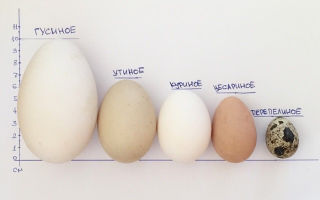Content
- 1 What do guinea fowl eggs look like?
- 2 The composition and calorie content of guinea fowl eggs
- 3 Do guinea fowl eggs eat
- 4 Useful properties of guinea fowl eggs
- 5 Guinea fowl egg shells: benefits and uses
- 6 What is the difference between a guinea fowl egg and a chicken egg
- 7 The use of guinea eggs in cosmetology
- 8 How to cook and boil guinea fowl eggs
- 9 Harm of guinea fowl eggs and contraindications to use
- 10 How to choose and store guinea fowl eggs
- 11 Conclusion
Guinea fowl is a domesticated bird native to West Africa. The closest relative is chicken. Not everyone knows the benefits and harms of guinea fowl eggs. However, with the development of private enterprise, this product has become more common in the trade network.
What do guinea fowl eggs look like?
From one individual receive from 80 to 120 eggs per year. Productivity is low, the price of the product is quite high. Eggs have the following characteristics:
- weight - 40–48 g;
- shape - pear-shaped;
- shell - thick, rough, may have a small spot size;
- color - yellowish brown.
Guinea fowl eggs are slightly smaller than usual. The shape is drop-shaped, reminiscent of a small pear. Their properties, benefits and harms are significantly different from other types.
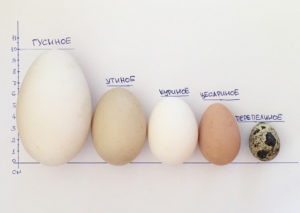
The composition and calorie content of guinea fowl eggs
Benefit in unique nutritional and medicinal properties, valuable substances. Easy to digest and do not carry dangerous amounts of cholesterol. There is practically no harm from them to healthy people.
|
Energy value, kcal |
145–162 |
|
B (proteins, d) |
13,62 |
|
F (fats, g) |
12,01 |
|
U (carbohydrates, g) |
1,89 |
They contain a high concentration of vitamins: A, B, E, D, PP, microelements: K, Fe, Ca, Mg, P, amino acids: lysine, cystine, glutamine, asparagine, methionine.
Do guinea fowl eggs eat
They have hypoallergenic properties. Even very young children can be introduced into the menu. Almost no cholesterol. Can be used in the diet of people with diseases of the vascular system. Before entering the menu, you should study the benefits and harms of the product well.
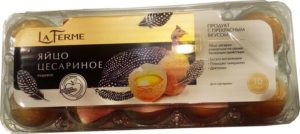
Useful properties of guinea fowl eggs
A special feature is the increased content of vitamin A. This determines the benefits of eggs. Low calorie content and low fat content impart dietary properties. Guinea fowl eggs help against diseases:
- anemia;
- loss of strength;
- depletion of the body;
- violations of visual function;
- improper metabolism;
- diseases of the central nervous system;
- problems with the gastrointestinal tract;
- acne;
- some other pathologies.
The unique bactericidal properties make the product resistant to various infections and safe to eat raw. This allows you to maximize the preservation of the valuable vitamin and mineral composition. The benefits of guinea eggs for men are as follows:
- Protein source.
- Rich vitamin complex.
- A high content of substances necessary for the full functioning of the reproductive system (pyridoxine, retinol, riboflabin, tocopherol, calciferol).
- There are unique amino acids that the body does not produce. Their deficiency leads to a decrease in libido, a breakdown.
Guinea fowl eggs are beneficial and harmless to children due to their beneficial effect on the gastrointestinal tract, easy digestibility, hypoallergenic properties, and useful composition. Can only be given after consultation with a pediatrician.
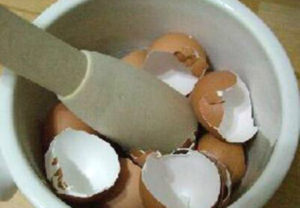
Guinea fowl egg shells: benefits and uses
The dense shell contains a variety of trace elements. Its benefits are in high calcium concentration.This substance is necessary in such cases:
- early childhood for the formation of the bone apparatus;
- elderly people to avoid injuries and fractures;
- muscle work;
- transmission of nerve impulses;
- ensuring sound sleep.
At home, you can make shell powder. Boil it in two waters, dry it, grind it. Take a teaspoon every day. The benefit of such calcium is its easy and more complete absorption. Also, there is no harm usual for synthetic substances.
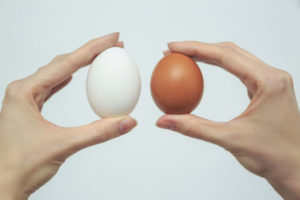
What is the difference between a guinea fowl egg and a chicken egg
Dietary, hypoallergenic, in terms of useful properties and shelf life, they significantly exceed chicken. The duration of storage of guinea fowl eggs at a temperature of +6 ° C reaches 5 months. The shell is much thicker and stronger. There are fewer pores on it, so the freshness lasts longer. The dry matter content is higher. Means less possibility of water loss. It is more profitable to store and transport goods with such useful properties over long distances.
Guinea fowl eggs are also useful for their rich chemical composition. They have a high concentration of manganese and zinc. The amount of carotenoids is several times higher. They are hypoallergenic and do no harm to anyone. Unlike chicken, which can cause allergies. The protein is rich in lysocine, a bactericidal element.

The use of guinea eggs in cosmetology
A useful product has not bypassed such a science as cosmetology. Hair mask with guinea fowl egg has many-sided effects:
- moisturizes;
- strengthens;
- nourishes.
Preparing a useful remedy is simple. Beat two eggs in a blender with a little water. Apply to hair and keep for half an hour. The benefits of the procedures will appear after a few sessions. The product is used in the composition of medical masks to restore the skin of the face, the whole body. Mix the yolk with the oatmeal. The therapeutic mass is applied for ¼ hours.
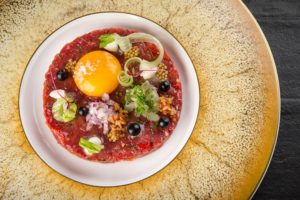
How to cook and boil guinea fowl eggs
It is preferable to cook with minimal thermal stress. This will preserve the valuable unique properties and benefits of the product. The following options will work:
- soft-boiled;
- poached eggs;
- omelet;
- others.
You can use it in baking, in the preparation of desserts, sauces. There is more useful yolk than usual. It tastes sweet, ideal for making eggnog. Poached eggs are very easy to cook. It turns out a neat white roll, which is seasoned with olive oil, lemon juice, herbs. The nutritional properties of such a dish are healthy and varied.

Harm of guinea fowl eggs and contraindications to use
The use of guinea fowl eggs as a dietary product is undeniable. It is recommended to be included in the menu for various diseases. It is a useful remedy for the prevention and strengthening of the body. Excessive or improper use can be harmful.
During pregnancy and young children, do not consume the product raw. It is better to subject it to minimal heat treatment. This will help reduce the stress on the digestive tract. With chronic pathologies of the liver, kidneys, regular use of the product is undesirable. It is possible, instead of benefit, to cause irreparable harm. It is allowed to enter the diet from time to time in small quantities.

How to choose and store guinea fowl eggs
They are tear-shaped, small in size. Their color scheme does not go beyond the yellow-brown tones. The shell is denser. Often has small specks. For storage, the most useful are a refrigerator (up to +10 ° C), a pantry, a cellar. At room temperature, the product should be packed in a cardboard box with:
- sawdust;
- paper;
- dry sand;
- salt;
- ash.
Sometimes frozen raw or hard-boiled. Valuable properties and benefits are preserved.
Conclusion
The benefits and harms of guinea fowl eggs are well known to traditional medicine in most countries. They serve not only as nourishing, wholesome food, but also as a unique therapeutic and prophylactic remedy for various diseases.

